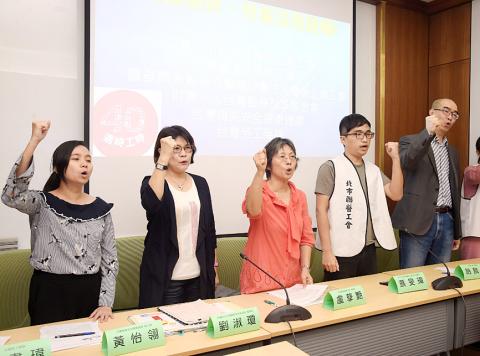Several medical labor rights groups yesterday urged the government not to amend the Labor Standards Act (勞動基準法) again, saying the law in its current form protects healthcare workers from overwork.
Original amendments to the act, promulgated on Dec. 23 last year, require that employees be given at least one fixed day off per week and at least 11 hours of rest time between shifts.
However, the Cabinet last week proposed conditionally easing the “one fixed day off and one flexible rest day” rule by allowing workers in certain industries to have two fixed days off every two weeks and at least eight hours of rest time between shifts in “exceptional circumstances,” which must be approved by a competent authority.

Photo: Huang Yao-cheng, Taipei Times
Lawmakers across party lines have expressed concern over the proposed changes, with some saying that exceptional circumstances might become the norm and that workers might be forced to work for 12 consecutive days before taking two days off.
Representatives from the Taiwan Healthcare Reform Foundation, Taiwan Nurses’ Union, Taipei City Hospital Labor Union, Chiayi Christian Hospital Labor Union, and Taiwan Occupational Safety and Health Link called on the Cabinet to withdraw the proposed amendment.
The “one fixed day off and one flexible rest day” policy has gradually improved healthcare workers’ labor conditions, but now the government wants to amend the act again to satisfy employers, they said at the Legislative Yuan.
Healthcare workers are already overworked and the proposed amendment would only make their working conditions worse, they said, adding that without sufficient rest, workers are likely to provide low-quality treatment and care.
“A possible scenario is that a burnt-out worker who works 40 hours per week gets sick and is treated by healthcare practitioners who work 80 hours per week,” federation chief executive Joanne Liu (劉淑瓊) said.
Overworked healthcare practitioners would be at greater risk of making mistakes, Liu added.
Although nurses are included in the act, hospitals often ignore the regulation and force nurses to work for long hours and irregular shifts that include sudden notices asking them to take compulsory leave, Taiwan Nurses’ Union chairwoman Lu Zxy-yann (盧孳豔) said.
While there about 260,000 licensed nurses in the nation, only about 160,000 work as nurses in healthcare facilities, she said.
Any amendments should be aimed at solving staffing problems rather than loosening the standards that protect nurses’ working conditions, she said.
Overall unionization rate in the nation is only about 6.3 percent and it is only about 0.5 percent at healthcare facilities, so it would be difficult for workers to negotiate with their employers for their rights, as there is a clear imbalance of power between employers and employees, Lu said.
Taipei City Hospital Labor Union chairman Tsai Min-chang (蔡旻璋) said that hospital management were forced to solve a staff shortage problem because of the “one fixed day off and one flexible rest day” policy, but the proposed amendment would “turn the clock back” and sacrifice the safety of healthcare workers and patients.

Taiwanese were praised for their composure after a video filmed by Taiwanese tourists capturing the moment a magnitude 7.5 earthquake struck Japan’s Aomori Prefecture went viral on social media. The video shows a hotel room shaking violently amid Monday’s quake, with objects falling to the ground. Two Taiwanese began filming with their mobile phones, while two others held the sides of a TV to prevent it from falling. When the shaking stopped, the pair calmly took down the TV and laid it flat on a tatami mat, the video shows. The video also captured the group talking about the safety of their companions bathing

US climber Alex Honnold is to attempt to scale Taipei 101 without a rope and harness in a live Netflix special on Jan. 24, the streaming platform announced on Wednesday. Accounting for the time difference, the two-hour broadcast of Honnold’s climb, called Skyscraper Live, is to air on Jan. 23 in the US, Netflix said in a statement. Honnold, 40, was the first person ever to free solo climb the 900m El Capitan rock formation in Yosemite National Park — a feat that was recorded and later made into the 2018 documentary film Free Solo. Netflix previewed Skyscraper Live in October, after videos

Starting on Jan. 1, YouBike riders must have insurance to use the service, and a six-month trial of NT$5 coupons under certain conditions would be implemented to balance bike shortages, a joint statement from transportation departments across Taipei, New Taipei City and Taoyuan announced yesterday. The rental bike system operator said that coupons would be offered to riders to rent bikes from full stations, for riders who take out an electric-assisted bike from a full station, and for riders who return a bike to an empty station. All riders with YouBike accounts are automatically eligible for the program, and each membership account

A classified Pentagon-produced, multiyear assessment — the Overmatch brief — highlighted unreported Chinese capabilities to destroy US military assets and identified US supply chain choke points, painting a disturbing picture of waning US military might, a New York Times editorial published on Monday said. US Secretary of Defense Pete Hegseth’s comments in November last year that “we lose every time” in Pentagon-conducted war games pitting the US against China further highlighted the uncertainty about the US’ capability to intervene in the event of a Chinese invasion of Taiwan. “It shows the Pentagon’s overreliance on expensive, vulnerable weapons as adversaries field cheap, technologically